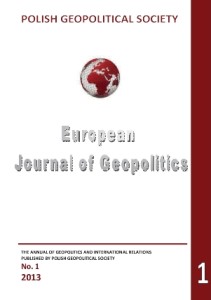JOACHIM LELEWEL’S GEOGRAPHICAL IDEAS AND HERITAGE
JOACHIM LELEWEL’S GEOGRAPHICAL IDEAS AND HERITAGE
Author(s): Piotr L. WilczyńskiSubject(s): Politics / Political Sciences, Politics, History, Philosophy, Social Sciences, Geography, Regional studies, Political Theory, Sociology
Published by: Polskie Towarzystwo Geopolityczne
Keywords: Joachim Lelewel; history of geographical thought; philosophy of geography; geographer; historical geography
Summary/Abstract: During the IGU Congress in 1934 held in Warsaw there was presented the project of new international scientific organization, namely Joachim Lelewel Society, which was to deal with history and philosophy of geography. Unfortunaltely this decision was not carried into effect because of incoming global conflict and World War II that disabled the necesary friendly contacts between potential members. Joachim Lelewel (1786-1861) was one of the most important founders of history of geography. This field was his inspiration and source of research interests. Lelewel understood that the condition of geography's development is both the increase in theoretical concepts necessary to comprehend and describe the Earth surface, and the extension of geographical horizon due to exploration. According to his views, the pure description and map making is not sufficient to be called geography. This is because geography is a special kind of knowledge which embraces all the terrestial phenomena, and this could be substantiate on the basis of history of geographical ideas. Moreover, an exact recognition of geography's development is the best basis for future research. Lelevel has expressed his philosophy of the field mainly in his works concerning the development of ancient and medieval geography. Those works gave him respect of such known persons like Karl Ritter, Hermann Wagner or Lucien Gallois. The purpose of this short paper is to show the Lelevel's main ideas and concepts concerning the essence of geography. This is necessary since this XIXth century scholar, who became the patron of the international scientific society, remains rather not known among contemporary scientists. The additional aim is to show, that his original ideas could be useful from the point of view of contemporary geographical problems and interests.
Journal: European Journal of Geopolitics
- Issue Year: 2013
- Issue No: 1
- Page Range: 95-108
- Page Count: 14
- Language: English

